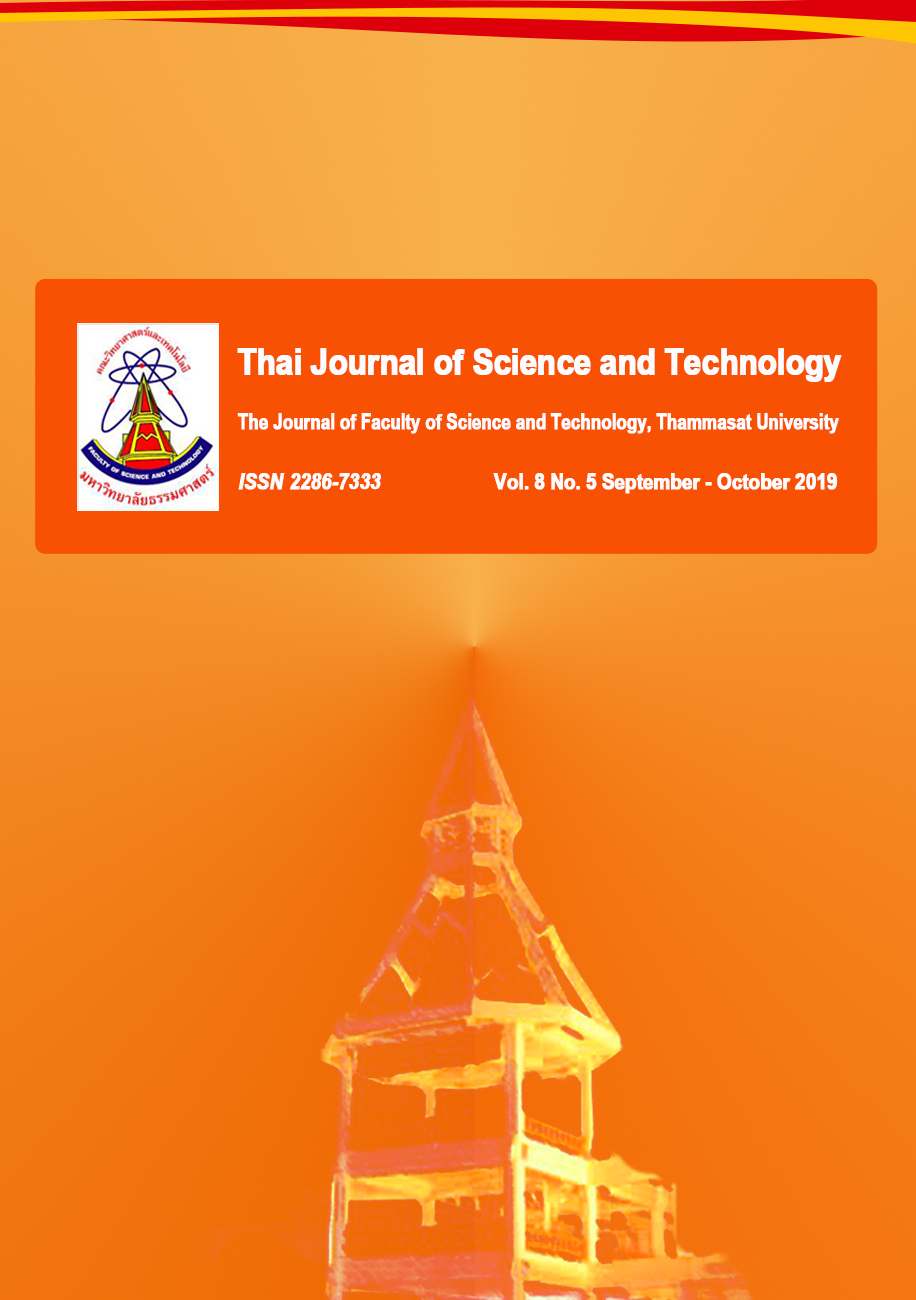การใช้ระบบการรับรองแบบมีส่วนร่วมสู่เกษตรอินทรีย์ยุค 3.0 และเพิ่มรายได้ของเกษตรกรรายย่อย
Main Article Content
Abstract
Abstract
Application of participatory guarantee system (PGS) to organic farming movement within the small grower community was studied based on shared vision, trust - “integrity based approach”, horizontality, transparency, participatory, and learning process. National standard of Organic Thailand used organic products guarantee followed by PGS process and Organic 3.0 approach. Results showed that 34 growers passed organic farming certification system by PGS. Before PGS applied to small grower community, the average cost of organic farming was 1,512 bath per rai per year. After PGS applied, the average cost of organic farming was reduced to 450 baths per rai per year. This indicated that PGS reduced the cost production up to 70.23 %. Moreover, organic products price certified by PGS was increased 15-79 %. Its average revenue per rai per year was increased to 11.11 %. Furthermore, PGS enhanced woman farmer empowerment, improved human rights and health, helped people to reach quality organic foods, increased consumer acceptance, increased the strength of the group, and increased market channels. The farmers presented the most satisfaction with the certification of organic agriculture by the PGS system.
Keywords: PGS; Organic farming folk way; guarantee by the community
Article Details
บทความที่ได้รับการตีพิมพ์เป็นลิขสิทธิ์ของคณะวิทยาศาสตร์และเทคโนโลยี มหาวิทยาลัยธรรมศาสตร์ ข้อความที่ปรากฏในแต่ละเรื่องของวารสารเล่มนี้เป็นเพียงความเห็นส่วนตัวของผู้เขียน ไม่มีความเกี่ยวข้องกับคณะวิทยาศาสตร์และเทคโนโลยี หรือคณาจารย์ท่านอื่นในมหาวิทยาลัยธรรมศาสตร์ ผู้เขียนต้องยืนยันว่าความรับผิดชอบต่อทุกข้อความที่นำเสนอไว้ในบทความของตน หากมีข้อผิดพลาดหรือความไม่ถูกต้องใด ๆ
References
ชาลิสา สุวรรณกิจ และกนกเนตร เปรมปรี, 2559, การเปรียบเทียบต้นทุนและผลตอบแทนระหว่างการปลูกข้าวเกษตรอินทรีย์กับเกษตรเคมี, Veridian E-J. Silpakorn Univ. 9(2): 519-526.
มูลนิธิเกษตรอินทรีย์ไทย, 2558ก, มาตรฐานเกษตรอินทรีย์แบบมีส่วนร่วม, กรุงเทพฯ, 28 น.
มูลนิธิเกษตรอินทรีย์ไทย, 2558ข, แนวทางการตรวจเยี่ยมฟาร์มเพื่อนในระบบการรับรองแบบมีส่วนร่วม, กรุงเทพฯ, 23 น.
ราตรี ล้วนจิรพันธ์, 2553, การเปรียบเทียบต้นทุนและผลตอบแทนระหว่างการปลูกข้าวอินทรีย์และการปลูกข้าวใช้สารเคมี ในอำเภอสว่างอารมณ์ จังหวัดอุทัยธานี, รายงานการค้นคว้าอิสระระดับปริญญาโท, ภาควิชาเศรษฐศาสตร์ มหาวิทยาลัยเกษตรศาสตร์, กรุงเทพฯ.
อธิราช ศรีเสาวลักษณ์, 2558, What is Organic 3.0?, แหล่งที่มา : http://www.sathai.org/autopagev4/files/dqylHX7Thu50115.pdf, 3 มีนาคม, 2562.
อรกช เก็จพิรุฬห์, 2556, การเปรียบเทียบโครงสร้างต้นทุนและผลตอบแทนการปลูกข้าวแบบเกษตรเคมีและเกษตรอินทรีย์กรณีศึกษา ตำบลหนองโสน อำเภอสามง่าม จังหวัดพิจิตร, แก่นเกษตร 41(2): 171-180.
Altenbuchner, C., Vogel, S. and Larcher, M., 2017, Effects of organic farming on the empowerment of women: A case study on the perception of female farmers in Odisha, India, Women. Stud. Int. Forum 64: 28-33.
Bakewell-Stone, P., Lieblein, G. and Francis, C., 2008, Potentials for organic agriculture to sustain livelihoods in Tanzania, Int. J. Agric. Sustain. 6: 22-36.
Castro, F., 2014, Overview of Participatory Guarantee Systems in 2013, In Willer, H. and Lernoud, J. (Eds.), The world of Organic Agriculture, Statistics and Emerging trends 2014, IFOAM (Bonn) and FiBL (Frick).
Hendel, D., 1977, AERA Mini Presentation. Value based Management.net. 7-S Framework of McKinsey, Available Source: http://www.valuebasedmanagement.net/methods_7S.html., February 9, 2017.
IFOAM-Organics International, 2017, Organic 3.0 - For Truly Sustainable Farming and Consumption, Available Source: www. ifoam.bio/organic3zero, March 3, 2019.
Kasikorn Research Center in Thailand, 2007, Organic Thai Agriculture Opportunity… If the Government Accelerated the Standard of Production, Available Source: https://www.kasikornresearch.com/TH/K-EconAna lysisPages/ViewSummary.aspx?docid=14345, March 21, 2019.
Kirchner, C., 2014, Participatory guarantee systems (PGS): How PGS can intensify knowledge exchange between farmers, IFOAM Organic World Congress 2014 “Building Organic Bridges”, Istanbul.
Lundberg, J. and Moberg, F., 2009, Report: Organic Farming in Brazil. Swedish Society for Nature Conservation, Stockholm, Sweden, Available Source: http://www.ifoam.bio, March 3, 2019.
Malakouti, J., 2014, Organic agriculture is the way of human salvation, J. Sabzineh 92: 15-16.
Morshedi, L., Lashgarara, F., Hosseini, S.J.F. and Najafabadi, M.O., 2017, The role of organic farming for improving food security from the perspective of fars farmers, Sustain. (Switz.) 9(11): 2086.
Nelson, E., Gomez Tovar, L., Schwentesius Rindermann, R. and Gómez Cruz, M., 2010, Participatory organic certification in Mexico: An alternative approach to maintaining the integrity of the organic label, Agric. Human Values 27: 227-237.
Reyes, T., 2008, Agroforestry systems for sustain able livelihoods and improved land management in the East Usambara Mountains, Tanzania, Academic Disserta tion, Helsinki.


